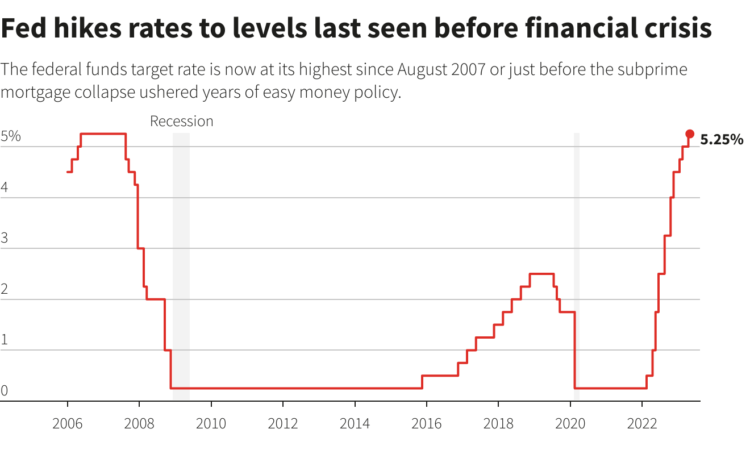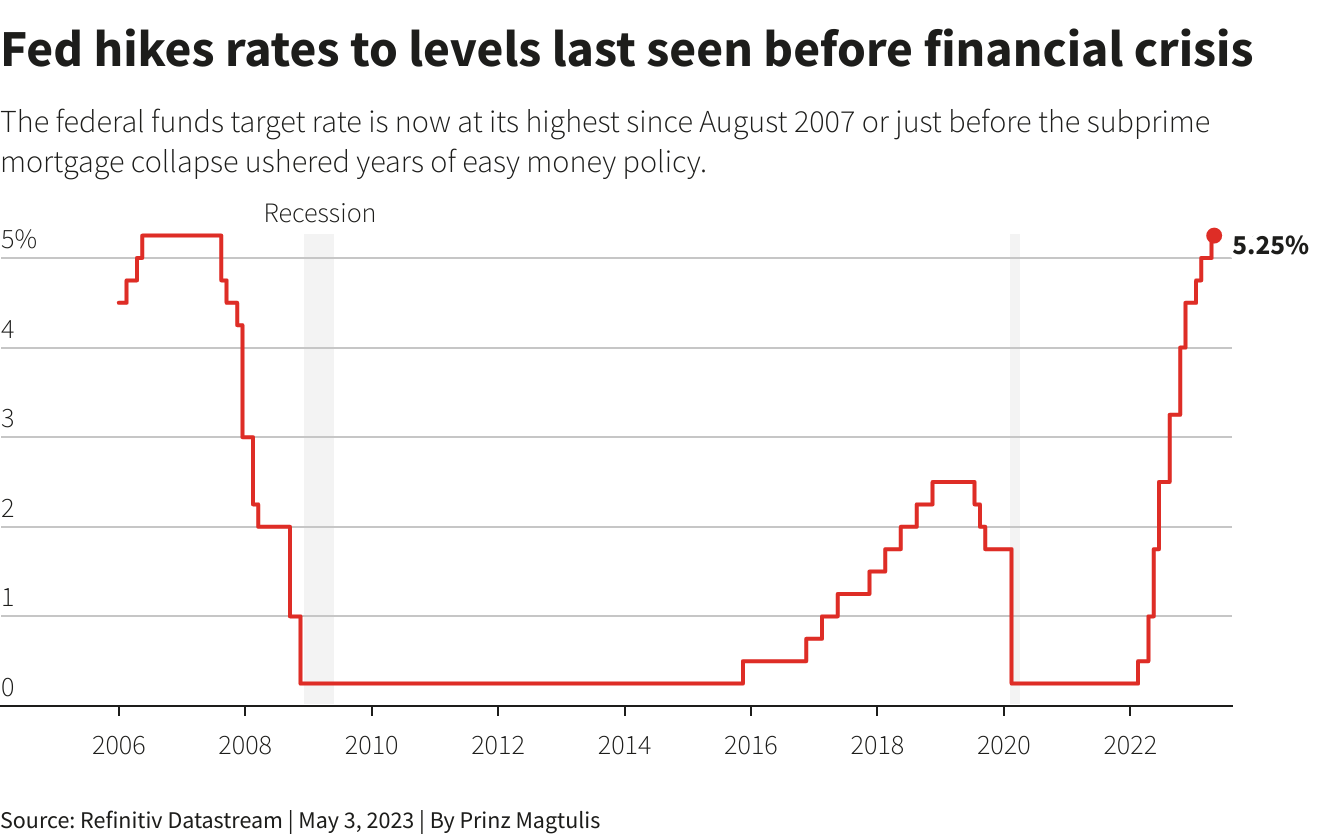
- This weekly round-up brings you the latest stories from the world of economics and finance.
- Top economy stories: US banking concerns widen as regulators seize First Republic; More interest rate increases by US and ECB; IMF raises Asia economic forecast.
1. US banking concerns widen as regulators seize First Republic
US regulators seized First Republic Bank and sold its assets to JPMorgan Chase this week, in a deal to resolve the largest US bank failure since the 2008 financial crisis. The move is an attempt to draw a line under a lingering period of banking turmoil that began with the collapse of US lenders Silicon Valley Bank and Signature Bank in March.
First Republic was among the regional US lenders most impacted by the resulting crisis in confidence in the banking sector, as depositors fled from smaller banks to giants like JPMorgan. It had limped along since then, but investors fled again last week when it disclosed more than $100 billion in outflows in the first quarter.
Attention has since turned to Los Angeles-based bank PacWest Bancorp, whose share price has slumped after it said it has entered talks with potential partners and investors about strategic options. This reignited market fears of a worsening banking crisis and dragged down the share prices of other regional lenders.
There are “increasing concerns that the banking crisis could take another turn for the worse … as worries swirl about deposit flight and the lack of asset diversification among smaller lenders,” Susannah Streeter, Head of Money and Markets at financial services company Hargreaves Lansdown, told Reuters.
US President Joe Biden has hailed the First Republic deal for protecting depositors without making taxpayers foot the bill. But he has also repeated his call for stronger regulation and supervision of large and regional banks.
The news comes alongside a new Gallup survey that found nearly 50% of American adults are concerned about the security of the money they keep in banks.
2. More interest rate rises by US and ECB – but is the end in sight?
The US Federal Reserve and European Central Bank (ECB) both raised interest rates by a quarter of a percentage point this week. But while the US is signalling this may be the last in a historic series of rate rises, the ECB says further increases are likely.
The US central bank lifted its benchmark overnight interest rate to 5.00-5.25% – its highest level in 16 years – but in doing so it dropped language from its policy statement saying that it “anticipates” further rate increases. The change doesn’t stop the bank’s policy-setting committee from hiking rates again. However, Fed Chair Jerome Powell says it is now an open question whether further increases will be warranted in an economy still facing high inflation but also showing signs of a slowdown – and with risks of a tough credit crackdown by banks on the horizon.
The ECB has raised interest rates to 3.25%, as expected, and says further action is still likely given mounting wage and price pressures. The hike is a slowdown after three consecutive 50 basis-point increases, but the bank has still lifted rates by a combined 375 basis points since last July – its fastest-ever pace of tightening.
The latest rise comes days after Eurozone banking data showed the biggest drop in loan demand in over a decade, suggesting that previous rate rises are working their way through the economy and that ECB policies are now restricting growth.
Policymakers had been split in the run-up to the meeting over a 25 basis-point and a 50 basis-point rise. But the case for a smaller move was supported by the facts that the Eurozone economy barely grew last quarter and that banks are tightening access to credit, raising the risk of a credit crunch. Underlying inflation has also stopped rising – at least for the time being.
Most big central banks around the world are now moving in 25-basis-point increments after big hikes earlier. Several banks in the Middle East followed the Fed and raised interest rates by 25 basis points this week, as did Hong Kong’s Monetary Authority.
3. News in brief: Stories on the economy from around the world
The International Monetary Fund (IMF) has raised its economic forecast for Asia, saying that China’s recovery will underpin growth. However, it also flagged potential risks from persistent inflation and global market volatility driven by Western banking-sector woes.
The IMF has also warned of “uncertainty” around the direction of Japan’s monetary policy, saying a possible shift away from ultra-low interest rates could have a significant impact on global financial markets. The Bank of Japan last week announced a broad review of its monetary policy and removed a pledge to keep interest rates at “current or lower levels”.
The risk of a US debt default is looming larger, with the government potentially running short of funds to pay its bills as early as 1 June, Treasury Secretary Janet Yellen says. The government’s current debt ceiling is set at $31.4 trillion, and a political standoff is preventing it from being raised. A US debt default would be unprecedented and would shake the global economy.
The conflict in Sudan has dealt a crippling blow to the country’s economy, as well as disrupting internal trade routes, threatening imports and triggering a cash crunch. Factories, banks, shops and markets have been looted or damaged, power and water supplies have been failing, and residents have reported steep price rises and shortages of basic goods.
South Korea’s annual consumer price inflation eased for a third consecutive month to a 14-month low of 3.7% in April. The central bank expects the downward trend to persist for some time, supporting the market’s view that its policy-tightening cycle is over.
Australia’s central bank stunned markets this week by raising its cash rate by 25 basis points, saying that inflation is way too high and that even further tightening may be needed as a result. An extended pause in rate rises had been expected. The cash rate now sits at 3.85%, its highest since early 2012.
German services sector activity grew at its fastest pace in a year in April. The HCOB services Purchasing Managers’ Index (PMI) rose to 56.0, from 53.7 in March. Demand and new orders have increased for three consecutive months, with significant growth in exports.
Pakistan’s inflation rate rose to a record 36.4% in the year to April, driven mainly by food prices. This is the highest rate in South Asia and is up from 35.4% in March.
The World Bank’s board of governors has elected former Mastercard CEO Ajay Banga to a five-year term as president. The Indian-born finance and development expert will be tasked with revamping the lender to tackle climate change and other global crises.
4. More on finance and the economy on Agenda
As the world faces deep economic uncertainty and a disrupted jobs outlook, what does the term “growth” actually mean? Leaders and experts at the World Economic Forum’s Growth Summit 2023 outlined what inclusive, sustainable and resilient growth means to them and their communities.
More than a quarter of all venture capital funding went into climate technology in 2022, according to PwC. But there is regional disparity and much of this funding is focused on the US and Europe, the Forum’s Growth Summit 2023 heard in discussions about how to fund a faster green transition.
Economic uncertainty means companies need to prepare for a range of possibilities, says consulting firm Bain. From stress-testing to strengthening balance sheets, here are some actions businesses should be considering.






